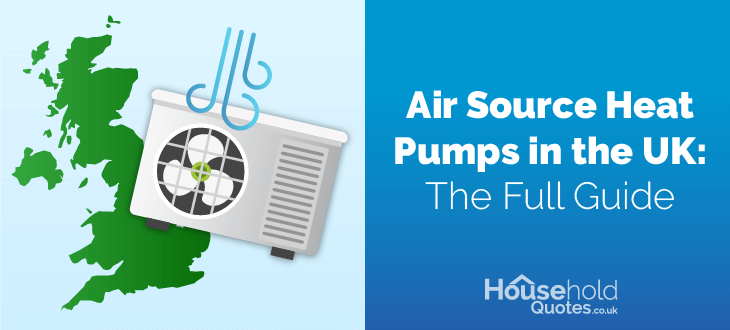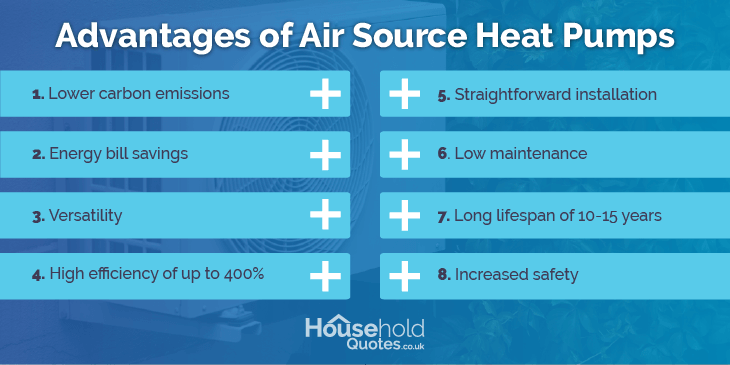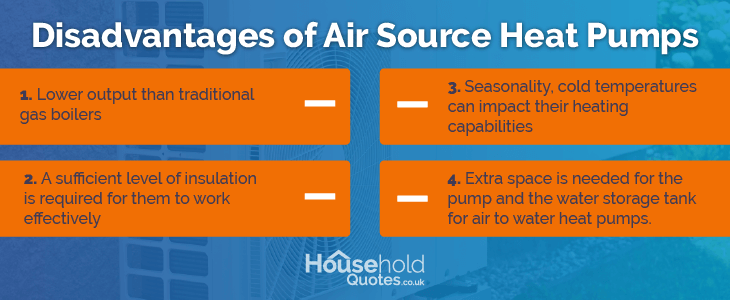Answer these simple questions and we will find you the BEST prices
Which type of solar quotes do you need?
It only takes 30 seconds
100% free with no obligation

Get up to 4 quotes by filling in only 1 quick form

Install a heat pump for less with the BUS grant

Increase the value of your home by installing a heat pump
- Householdquotes.co.uk
- Heat Pumps
- Air Source
Air Source Heat Pumps in the UK: The Full Guide (2025)


- Air source heat pumps (ASHPs) are highly efficient, low-carbon heating and cooling systems.
- The biggest advantage of ASHPs is their outstanding energy efficiency, with some models reaching a 400% rating - producing 4 times more energy than they consume.
- While the typical cost of an ASHP installation can range from £2,400 to £14,050, these systems can offer savings of up to £1,200 on your annual energy bills.
- You can get £7,500 off your installation costs with government grants such as the Boiler Upgrade Scheme (BUS).
Air source heat pumps (ASHPs) are highly efficient heating and cooling systems that can help homeowners save on energy bills and lower carbon emissions, with energy efficiency ratings reaching up to 400%.
While generous government grants like the Boiler Upgrade Scheme in England and Wales offer up to £7,500 to encourage the switch to renewable heating, recent reports show that nearly £60 million in UK heat pump funding remains unused, despite the outstanding efficiency and environmental benefits of ASHPs.
Therefore, it's crucial to stay informed about the latest developments and available air source heat pump grants to help offset the significant upfront costs. Taking advantage of these opportunities can make the transition to heat pumps, which are highly efficient and environmentally friendly, more accessible.
Receive up to 4 non-binding and completely free quotes from our network of vetted installers and obtain tailored advice on which ASHP would best fit your home’s needs. Click the button below to begin. It takes less than a minute!
- Quotes from local installers
- Payment by finance available
- Save £7,500 with BUS grant
It only takes 30 seconds

- What is an air source heat pump?
- How does an air source heat pump work?
- Air source heat pump benefits
- Advantages and disadvantages of an air source heat pump
- The different types of air source heat pumps
- Air source heat pump efficiency
- What are the costs and savings of an air source heat pump?
- Is an air source heat pump the right choice for my household?
- FAQ
What is an air source heat pump?
So, what is an air source heat pump? Well, air source heat pumps (ASHPs) are low-carbon technologies that offer efficient and versatile heating and cooling options according to your needs. These systems work by extracting heat from the surrounding air and transferring it indoors during winter to provide heating. In summer, they reverse this process to provide cooling.
There are two main types of air source heat pumps: air to water and air to air heat pumps. Air to water heat pumps not only provide efficient heating but also attend to your hot water supply, ensuring a reliable and integrated solution for your home's thermal needs. In contrast, air to air heat pumps focus solely on warming and cooling the air, utilising a fan-based ventilation system to circulate the conditioned air throughout your home.
In the coming sections, the different types of air source heat pumps will be further discussed, while also providing insight into the advantages and disadvantages of air source heat pumps, their efficiency, costs and if this low-carbon alternative is the right choice for your home.
How does an air source heat pump work?
We’ve seen what air source heat pumps are and how they can provide both heating and cooling based on your needs. However, you might be wondering: How do air source heat pumps work?
Air source heat pumps work by extracting heat from the outside air and transferring it indoors, reversing this operation to provide cooling The process begins with a liquid refrigerant circulating through a heat exchanger, where it absorbs heat from the surrounding air. This causes the refrigerant to evaporate, turning it into a low-pressure, low-temperature gas.
The gas is then compressed, which increases its pressure and temperature. The hot gas then passes through another heat exchanger, where it transfers its heat to a water circuit. This heats the water, which can then be used for space heating or domestic hot water. As the refrigerant releases its heat, it cools down and condenses back into a liquid.
Lastly, the refrigerant passes through an expansion valve, which lowers its pressure and allows it to absorb more heat from the outside air, repeating the cycle.
Air source heat pump benefits
The benefits of air source heat pumps are numerous and wide-ranging. From increased energy efficiency to significant cost savings, these versatile heating and cooling systems offer several advantages for homeowners. Let's take a closer look at the key benefits of air source heat pumps:
- By pairing your air source heat pump with solar panels, you can achieve a 100% renewable energy target, maximising the environmental benefits.
- Air source heat pumps are highly efficient, boasting up to 300% more efficiency than traditional heating systems like gas boilers.
- Grants such as the Boiler Upgrade Scheme, combined with the energy savings provided by air source heat pumps, can make them a cost-effective heating solution for homeowners in England and Wales making replacing your boiler with a heat pump more interesting.
- Using an air source heat pump can reduce your carbon emissions by around 12% per year, making them a more sustainable choice.
- Air source heat pumps operate quietly, generating noise levels comparable to a standard household refrigerator and ensuring a peaceful living environment.
Advantages and disadvantages of an air source heat pump
As shown above, the benefits of air source heat pumps make them an attractive option to consider for your home. These systems offer a wide range of advantages, from increased energy efficiency to cost savings.
However, despite these significant benefits, air source heat pumps also have some potential drawbacks that should be carefully evaluated before making a final decision. For further insight, throughout this section, we’ll explore the different advantages and disadvantages of air source heat pumps.
Air source heat pump advantages

- Lower carbon emissions: ASHPs are a type of renewable energy that produce significantly lower carbon emissions than other conventional heating systems. While gas boilers generate up to 2,500kg of CO2 per year, ASHPs typically produce around 850kg.
- Energy bill savings: By switching to an ASHP, homeowners can potentially save as much as £1,200 on their energy bills, depending on the type of system they are replacing.
- Versatility: ASHPs can provide both heating and cooling, as well as hot water (when it comes to an air to water heat pump), effectively combining the functions of a boiler and an air conditioner.
- High efficiency: ASHPs boast impressive efficiency rates of up to 400%, as measured by the Coefficient of Performance (CoP), which ranges from 2 to 4 for these systems.
- Straightforward installation: Air source heat pump installation is relatively straightforward, often completed in around 2 days with minimal disruption to the comfort of your home.
- Low maintenance: Once installed, ASHPs only require occasional checks, usually every 2-3 years, to ensure they are operating correctly.
- Long lifespan: With proper care and maintenance, ASHPs can have a lifespan of 10-15 years, providing long-term heating and cooling solutions for homeowners.
- Increased safety: ASHPs run on electricity, eliminating the need for combustible fuels like gas, which significantly reduces the risk of accidents associated with a heating system.
Air source heat pump disadvantages

- Lower output: ASHPs generally produce less heat than traditional gas boilers, requiring larger radiators to effectively heat the same living spaces.
- Sufficient level of insulation: ASHPs work most effectively in well-insulated homes. Without proper insulation, the warmth produced by the ASHP can be rapidly lost, reducing its efficiency and costing homeowners money.
- Seasonality: ASHPs may experience a decline in efficiency when outdoor temperatures drop below 0°C, as the cold air can impact their heating capabilities. However, in the UK's generally mild climate, this may not be a significant issue often.
- High upfront costs: Even if eligible for government grants, ASHPs can be costly for some homeowners and thus become less attractive than other heating systems.
- Space requirements: Extra space will be needed both for the heat pump unit itself and for the water storage tank.
The different types of air source heat pumps
The two main types of air source heat pumps include air to air and air to water heat pumps. The main difference between these two types stems from how they distribute the heat they produce: through air or water. A lesser-known type is the hybrid air source heat pump, which essentially is a combination of an air source heat pump and a boiler.
Air to air heat pumps
An air to air heat pump is a type of air source heat pump that absorbs heat from the outside air and transfers it into a home, usually via a ventilation system. Some key advantages of this system include reduced electricity use for heating, the ability to act as both a heater and air conditioner, high efficiency, and a long lifespan of 10-15 years.
This type of heat pump works by using vapour compression refrigeration to extract heat from the outside air and release it indoors. The process involves drawing in ambient air, transferring heat to a refrigerant, compressing the refrigerant vapour, releasing the heat inside, and circulating the cooled refrigerant back to repeat the cycle.
Air to air heat pumps can be an excellent alternative to gas boilers, significantly lowering energy bills. They can also be combined with gas boilers in hybrid heat pump systems for domestic hot water.
Air to water heat pumps
Air to water heat pumps, similarly to their air to air counterparts, are efficient heating solutions that can provide both heating and cooling for homes. They work by extracting heat from outside air and transferring it to a water-based distribution system, rather than using air like air to air heat pumps.
The process involves drawing in outside air, extracting heat from a refrigerant, compressing the vapour, and transferring the heat to the home's water system. This heated water can then be used for central heating via radiators or underfloor systems, as well as supplying domestic hot water.
The water-based distribution makes air to water heat pumps more versatile than air to air models, allowing them to effectively meet a home's heating, cooling, and hot water needs. Key benefits include high efficiency, suitability for underfloor heating, and a long 10-15 year lifespan.
Hybrid air source heat pumps
Hybrid heat pumps are a combination of a heat pump with a traditional gas or oil boiler. Through this combination, these systems provide consistent, efficient heating and hot water throughout the year, making them a highly versatile choice for modern homes.
Key advantages of hybrid heat pumps include energy savings, consistent heating, and suitability for large homes. Replacing a gas boiler with a hybrid system, for instance, can save nearly £300 per year on energy bills.
The heat pump and boiler work together to ensure reliable heating, even in very cold weather, making these heat pumps less susceptible to seasonality. Hybrid heat pumps can also automatically switch between components based on energy efficiency, maximising performance.
These systems are well-suited for larger properties with high heating demands and more available space. The combination of technologies makes hybrid heat pumps a flexible, efficient heating solution.
Interested in installing an air source heat pump but unsure of which type best meets your home’s requirements? We're here to help you. We work with a network of reputable specialists and can quickly connect you with up to 4 of them.
All you need to do is complete our 30-second form, and they'll provide you with free, no-obligation quotes. Click below to start finding the right installer for your project today:
- Quotes from local installers
- Payment by finance available
- Save £7,500 with BUS grant
It only takes 30 seconds

Air source heat pump efficiency
The biggest advantage of air source heat pump systems is without a doubt their outstanding efficiency rating, which can be as high as 400% in some cases.
This means that for every unit of energy used to power the heat pump, it can generate up to 4 units of usable heat energy. Below we have compiled an overview of the efficiency rating per air source heat pump type:
| Comparing efficiencies of common heating systems | |
|---|---|
| Heating system | Efficiency (%) |
| Air to air heat pump | 300% |
| Air to water heat pump | 400% |
| Electric heater | 100% |
| Gas boiler | 92% |
The high efficiency of air source heat pumps is due to the fact they do not generate heat directly, but rather transfer heat from the outside air into the home using electricity. This heat transfer process is much more efficient than traditional heating methods, such as boilers that generate heat through combustion.
The 400% efficiency rating, also shown as a Coefficient of Performance (COP) of 4, indicates that air source heat pumps can provide 4 times more thermal energy output than the electrical energy input required for the system to operate.
This outstanding efficiency is what makes air source heat pumps such an attractive and energy-saving heating and cooling solution for homes and explains the UK government's keenness to promote air source heat pumps.
What are the costs and savings of an air source heat pump?
Among the numerous advantages of air source heat pumps, the fact that they are the most affordable type of heat pump on the market should also be considered an important aspect before making a final decision.
With this being said, air source heat pump cost, including installation, ranges from £2,400 to £14,050. Nevertheless, this will ultimately depend on the type of ASHP you choose.
For instance, air to air heat pumps are more affordable than air to water source heat pumps. However, the latter can be a better long-term investment, since they can provide both heating and cooling, as well as hot water for domestic use.
For a better understanding of the costs associated with air source heat pumps, we’ve put together a table with the estimated costs and annual savings you can expect for each type.
| Air source heat pump average cost | ||
|---|---|---|
| ASHP system type | Estimated cost (including installation) | Estimated yearly savings |
| Air to air source heat pump | £2,400 – £8,800 | £750 – £950 |
| Air to water source heat pump | £8,750 – £14,050 | £45 – £440 |
Therefore, purchasing an air source heat pump is a significant investment, but there are grants available to help offset the costs. The Boiler Upgrade Scheme offers up to £7,500 for eligible homeowners in England and Wales, while the ECO4 grant is available across Great Britain.
Is an air source heat pump the right choice for my household?
Air source heat pumps are an excellent alternative to traditional heating systems if you’re looking to switch to a more sustainable and energy-efficient choice. Not only that, an additional advantage of ASHPs is their ability to provide both heating and cooling on demand, and in the case of air to water heat pumps, hot water for domestic use.
What is more, in comparison to gas boilers, ASHPs can reduce your annual carbon footprint by 1600kg! To provide you with some more insight, that’s the equivalent of driving 4,225 miles with a petrol car. Once you install an ASHP, you can also expect to save up to £1,200 on your energy bills.
Nevertheless, before making the big decision, it's important to ensure your home is properly insulated and evaluate your budget, as these systems can be quite expensive. The best way to find a good deal is to consult with a specialist in the field and compare installation quotes from multiple installers.
But where do you even find these installers on short notice? Fortunately, we've thoroughly vetted a network of reliable air source heat pump installers across the country.
Simply fill out our 30-second form, and we'll connect you with up to 4 providers who can offer free, no-obligation quotes for your new best air source heat pump. Take the first step towards an efficient, eco-friendly home by clicking below to get started!
- Quotes from local installers
- Payment by finance available
- Save £7,500 with BUS grant
It only takes 30 seconds

FAQ
The main disadvantages of air source heat pumps include lower heat output than gas boilers, the need for proper insulation to maintain efficiency and high upfront installation costs. Additional space requirements for the outdoor unit and water tank are also a consideration for air to water heat pumps.
Yes, ASHPs’ high efficiency of 400% makes them a compelling choice for homeowners aiming to reduce their carbon footprint while also saving on their energy bills.
Air source heat pumps can be up to 300% more energy efficient than traditional heating systems like gas boilers, allowing them to use significantly less electricity compared to electric resistance heaters
Yes, air source heat pumps can work effectively in winter. They are designed to operate even in sub-zero temperatures, though their efficiency may decline somewhat in very cold conditions. Overall, they remain a viable heating option in the UK’s generally mild winters.
Air source heat pumps are generally recommended to be left running continuously, as letting the temperature drop means the pump has to work much harder to warm the home again. Maintaining a steady, lower temperature when you’re out or asleep is more efficient than frequently cycling the heat pump on and off.

Alejandro, a copywriter at Household Quotes with a background in law and content creation, is passionate about sustainable and affordable home improvements, and how the EU is adapting its policies to combat climate change.
- Air Source Heat Pumps in the UK: The Full Guide (2025)
- What is an air source heat pump?
- How does an air source heat pump work?
- Air source heat pump benefits
- Advantages and disadvantages of an air source heat pump
- The different types of air source heat pumps
- Air source heat pump efficiency
- What are the costs and savings of an air source heat pump?
- Is an air source heat pump the right choice for my household?
- FAQ
